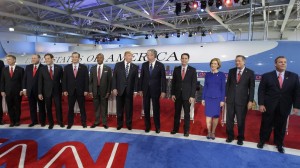So it would appear that the Obama Administration has crossed the finish line on the US-Iran nuclear deal or as it called, the Joint Comprehensive Plan of Action (JCPOA). The period of Congressional approval/disapproval – the 60-day period of congressional review – ends today. With the vote of disapproval eliminated, the US-Iran deal is secured. Of course ‘US approval’ says nothing about implementation, verification and surveillance. That will come next.
The vote – or non-vote as the case may be in the Senate – reveals apparently something fundamental about contemporary US foreign policy thinking and apparently policy-making – at least among the opponents especially in Washington. Many Democrats and other supporters – and also many in the media – have described this agreement as a likely contender for Obama’s signature foreign policy initiative. From this perspective the agreement drawing together the P5 (China, Russia, the UK, France, US) + 1 (Germany), implementing and maintaining sanctions on Iran and reaching a comprehensive agreement that backs Iran up to a year to nuclear breakout and restricts Iran’s nuclear capabilities for 15 years is a diplomatic triumph.
In the face of this rather triumphal expression, however, it is startling to hear fierce opposition to the deal. Republican Presidential candidates in the weeks preceding the then assumed vote and certainly last night at the second Presidential debate were vociferous in denouncing the agreement. Most candidates were shrill describing Obama’s weakness, his fecklessness and his unwillingness to maintain sanctions and a negotiating position to deny Iran any nuclear capacity. Indeed, in last night’s debate many if not most – that is 7 of the 15 – candidates announced their intention – if elected President – to renounce the deal the moment they reached the White House. Even those that backed away from renunciation, such as Ohio governor Kasich, called the agreement ‘bad’ but it was better to work with one’s allies that had negotiated the deal.
There was constant scolding of this deal. I began to wonder what this swath of presidential candidates and the beltway pundits understood to be a successful negotiation, successful diplomacy in other words. So I looked for a quick definition of diplomacy just to contextualize this discussion. Not as easy as I thought. I turned first to Henry Kissinger. After all, he did write the book Diplomacy. But no luck there. In the book, Kissinger launches almost immediately into a discussion of US foreign policy describing the schism in US policy between Realists and the various ‘liberal’ Presidents most notably Woodrow Wilson. Still he does hint at the elements of diplomacy, or at least US diplomacy: “democracy, free commerce, and international law.”
Without a definition there, however, I looked elsewhere. I turned my attention the well-known text on diplomatic history, this by Jeremy Black (A History of Diplomacy). Here I had more luck. Jeremy, himself, turned to a number of classic diplomatic texts including Peter Barber who simply defined diplomacy as “the peaceful management of international relations.” Perfectly serviceable though as Black pointed out diplomacy can be in service to a state preparing for conflict. And in that regard there is the well-known text by Paul Gordon Lauren, Gordon Craig and Alexander George titled: Force and Statecraft: Diplomatic Challenges of our Time.
It seems to me that talk in Congress and the beltway borders on the military first option only. It is as if diplomacy is some startling just discovered species. These candidates – but more generally it would appear in the beltway – there is little sentiment or appetite for diplomacy. US policy has become so dominated by the use/non-use of the military option, that there is little else that US foreign policy includes.
And then there is the discussion of multilateral action – or in fact, the lack of discussion. Indeed, again John Kasich was the only candidate I heard to even raise the idea of allies. You would never have known that this was a deal that was the culmination of hard multilateral effort. US hegemonic leadership has come to so dominate American foreign policy thinking that multilateralism has become a ‘non sequitur’ in US policy debates. It a forgotten idea.
So let’s look back first to the concept of multilateralism and then let’s try and contemporize the discussion.
Image Credit: cnn.com
he 60-day period of congressional review


